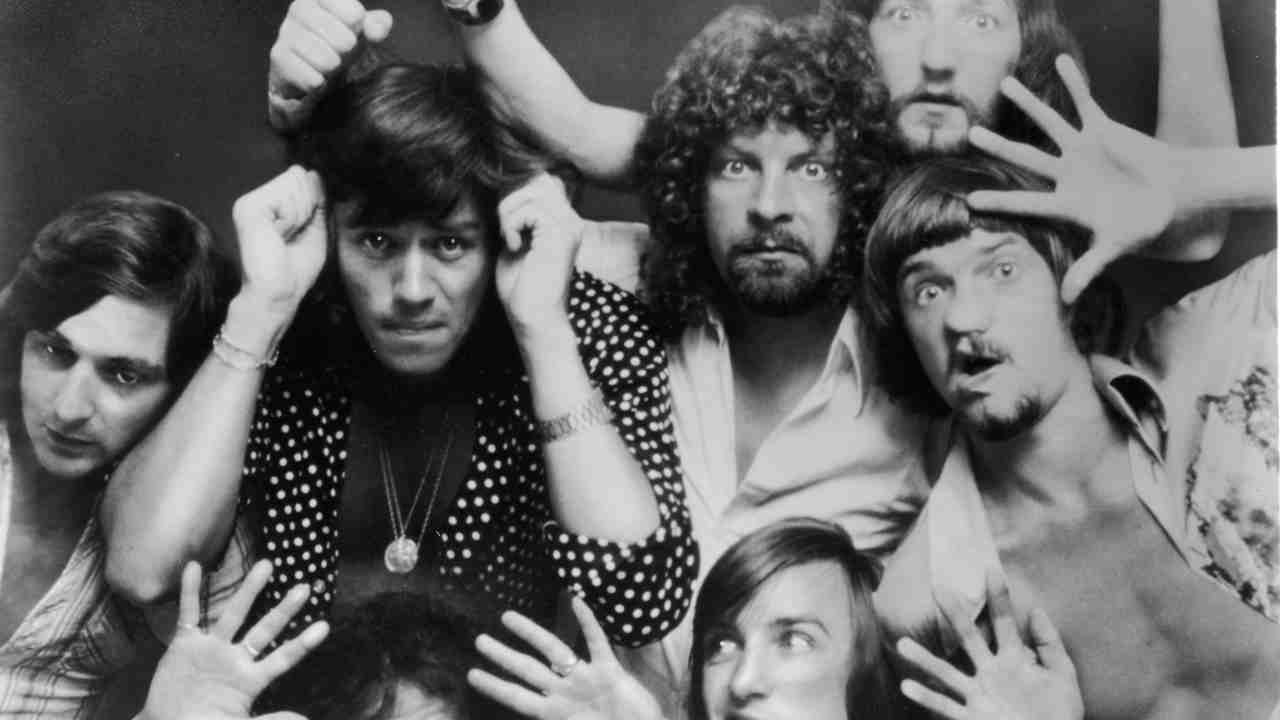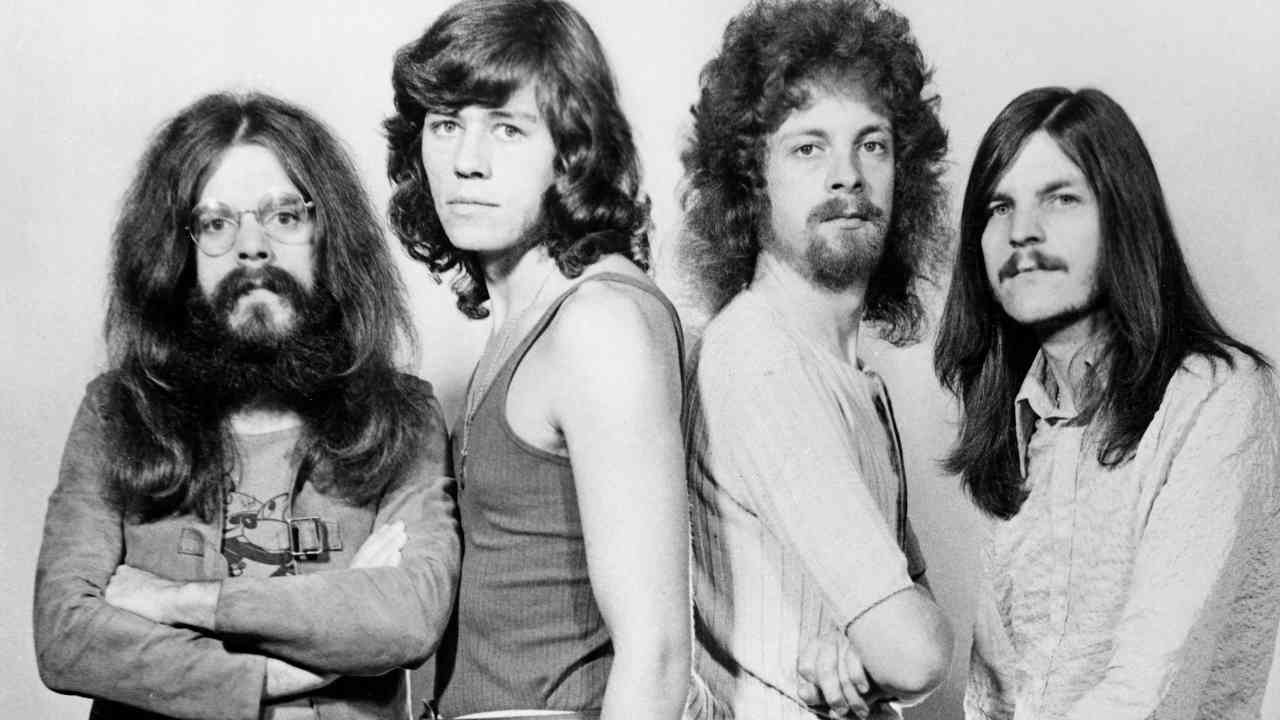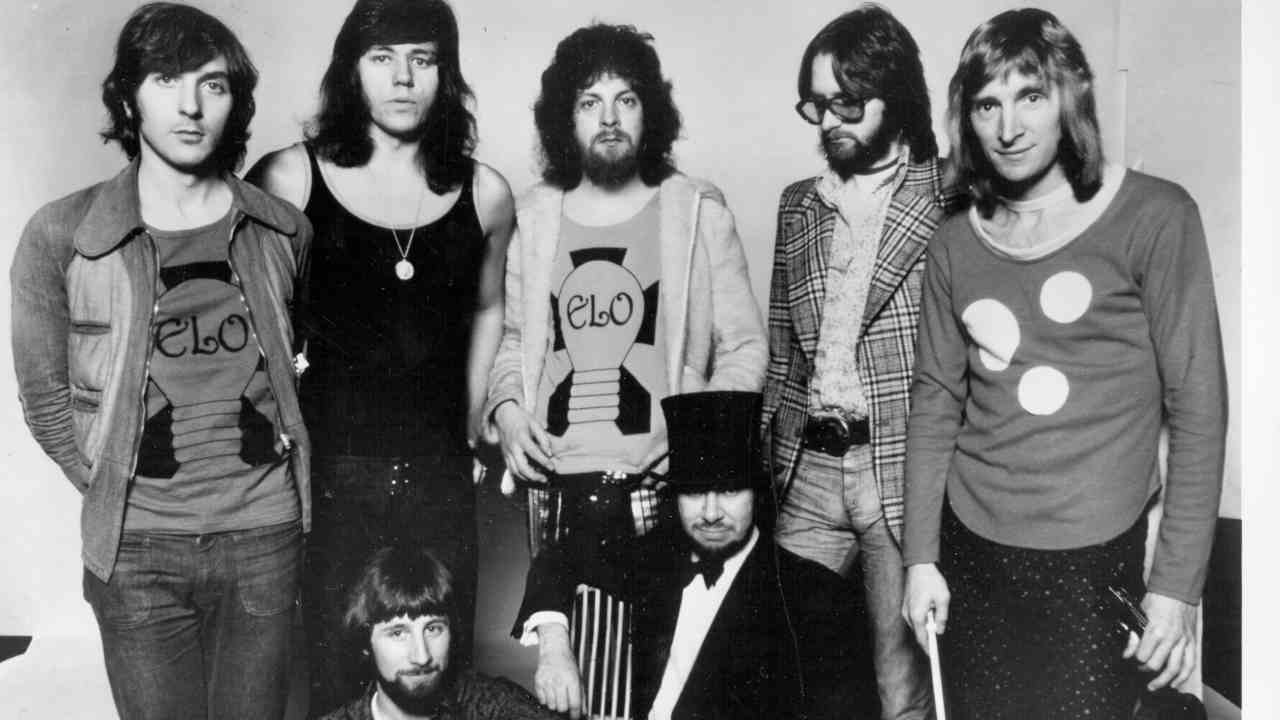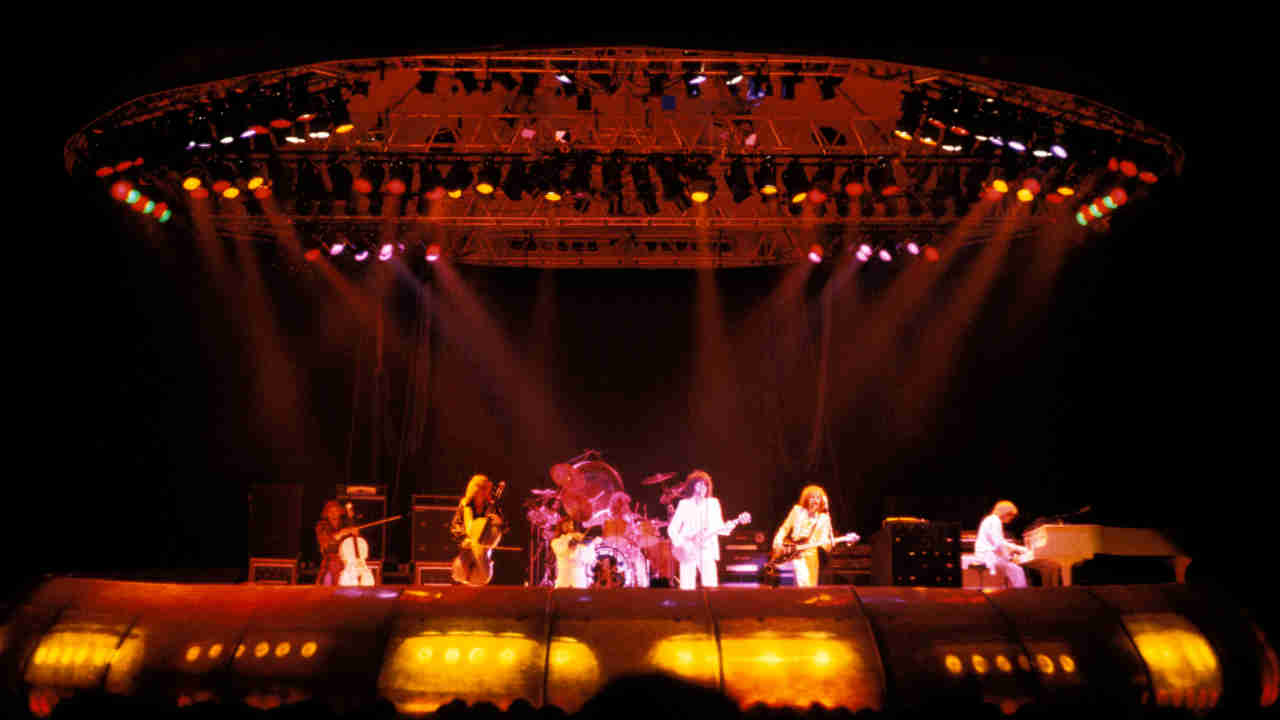
Way back in the 60s, The Move were part of a peculiar pop dynasty, huge and respected in the UK while never having quite made it in the USA. By the mid-70s this most English of bands had morphed into one of the few genuinely huge bands in the world – the Electric Light Orchestra.
By 1978 ELO were selling out eight nights on the trot at Wembley Arena during a memorable global tour. When their star shone it was with a dazzling brilliance. I was lucky enough to be hanging onto their coat-tails through the 70s as they went into overdrive and into orbit, knocking out a string of exceptional hit singles and albums.
Back to The Move. Led by eccentric pop genius Roy Wood, their single Flowers In The Rain was the first ever track played on Radio 1 when the station was launched at 7am on September 30, 1967. They were Birmingham’s Beatles.
At that time, Wood was The Move: a massively inventive pop writer, a great singer and a consummate showman. He came to dislike the limitations The Move imposed upon his creative ambitions. His canvas was bigger, more colourful, a grand, kaleidoscopic, wide-screen pop-o-rama.
The Move’s Brontosaurus, with its cello-stuffed riff, was a sign of things to come. Significantly, Wood had Jeff Lynne play on the session. He’d come to know Lynne through his work in the up-and-coming Brummie band The Idle Race. It was another sign that Wood wanted to take The Beatles’ orchestral experimentation on Strawberry Fields Forever and I Am The Walrus to new heights.
Wood had started to dabble in areas beyond drums, bass and guitar, and had taught himself to play the cello. But the master stroke that would lead to the switching on of the Electric Light Orchestra was in bringing in Lynne to replace departed singer Carl Wayne in The Move. It wasn’t long before the two of them made the idea of ELO a priority and a reality, and The Move swiftly became 60s history.

Move drummer Bev Bevan went along to the new band. “After doing all the similar pop stuff with The Move – all of Roy’s little ditties and things – we wanted to do something a bit more demanding,” Bevan said of the formation of ELO. “We just wanted to be accepted by more musically intelligent people.”
In Wood’s mind, the Electric Light Orchestra would make daring, innovative use of strings. This became apparent on early recordings when Wood himself played cello. These strings would not be used in lush arrangements, however, but would be in-your-face.
“I suppose that the Electric Light Orchestra is meant to take up where I Am The Walrus left off, and to present it on stage,” Lynne noted.
The news that The Move was disbanding in preference for ELO had their record company EMI in a spin – and when the label heard what was going on in the studio they almost suffered apoplexy.
“I think EMI were a bit nervous,” Wood recalled later, with knowing understatement. “Crikey, who wouldn’t be? From The Move pop to cellos and oboes all over the place.” But as there was another Move album in the works too (Message From The Country, released in 1971), EMI went along with what they considered to be Wood’s little eccentricities.
On the face of it, the pairing of Wood and Lynne was a dream team: two wonderful writers and singers. But they were on a collision course from the start. Lynne had other plans for ELO, but he would wait until he was firmly established in the band before making his move.
Electric Light Orchestra’s eponymous first album (called No Answer in the US) was a messy, unfocused affair, the band dabbling with experimentation while attempting to retain the pop sensibilities of The Move. It was a statement of sorts, with a few brilliant highlights, and the success of the first single, 10538 Overture, boded well for the future. In fact, that single entered the UK Top 10 around the time The Move’s final release, California Man (covered many years later by Cheap Trick), made its exit.
The potential ‘dream team’ collapsed when the eccentric Wood suddenly packed his cello case and made an acrimonious departure form ELO. Lynne and Wood are not what you’d call great talkers and, even a couple of years after parting, were refusing to give out much information concerning the split. They
were, coincidentally, both managed by the legendary Don Arden (father of Sharon Osbourne), who exerted substantial and persuasive influence over his acts, and had instructed Lynne to zip it on the subject of Wood.
The crux of the matter was that Wood saw the future of ELO as embracing the underground movement (they were on EMI’s progressive Harvest label, after all), but Lynne had a vision for the future that was most definitely overground – a view that was shared by Arden. Wood couldn’t accept that direction. Lynne won, and climbed into the ELO driving seat.
In retrospect, Lynne was not surprised when Wood walked out. “When we first started ELO there was a lot of pretentiousness,” he says. “I was doing stuff that I really didn’t want to do, but doing it all the same because I thought it was cooool, man! It was experimental, but there was no direction to it. We didn’t know which way to go. I mean, the songs weren’t particularly outstanding on that first album. As far as Roy is concerned, I think that we would have come to loggerheads musically if he had stayed. I wanted to be boss and he wanted to be boss, and things couldn’t be resolved. It would have happened sooner or later if he hadn’t left the band when he did.”
Lynne remained particularly icy on the subject. When he’d joined The Move, the band was effectively wound up, he said, and was recording just to satisfy contracts. He had only joined so that he too could be managed by Arden.
After quitting ELO, Wood, as if to prove he could still write hits, went on to form a new band, Wizzard, and rattled off a string of what became pop classics: Ball Park Incident, See My Baby Jive, Angel Fingers and, of course, I Wish It Could Be Christmas Every Day.
With Wizzard, Wood played the role of mad professor and sported multi-coloured beard and hair, adding a star to his forehead for good measure and covering his face with war paint, sprinkles or other decoration, and inspired Kiss along the way. Then he decided to pack pop in, became a virtual recluse, went into litigation with Don Arden… and promptly fell off the radar.
When he returned it was with a new group, Wizzo Band – a sort of left-field version of Wizzard. At the time, he was still trying to extricate himself from his contract with Arden. When we spoke, he scoffed at the notion that Lynne joined The Move just to cuddle up with the manager. The split with ELO, he said, was all down to “musical differences” about the future path for the group.
“I’ve never really regretted leaving,” he said. “I regret it in that if I hadn’t left I would have been successful with them in the States.”
Wood stayed out of the public eye for three years. “I’ve written something like 30 hit songs, you know,” he whispered with a perceivable sadness. “It’s not easy now to accept that I’m not a success any more.”
But Wood wasn’t helping himself in regaining commercial success. Taking the experimental lead from his original ELO concept further, his new band was now jazz-influenced.
“Don Arden and I didn’t see eye to eye on a lot of things,” he said. “He didn’t want me to form this new band because it was too jazzy. He wanted me to stick to pop songs, y’know, which I enjoyed doing occasionally, but you’ve got to progress with the times, and I enjoy playing this jazz rock stuff. People like Chick Corea and Stanley Clarke have been doing it for ages, but it’s very rare that you find a band doing it the other way round – a rock’n’roll band getting into jazz. And it’s quite interesting. The rhythm section is very heavy, almost Zeppelin-ish, the horns are very jazzy and the songs are very commercial, so it makes for quite an interesting combination.”
A few weeks later, Warner Brothers Records released Super Active Wizzo. But the public didn’t share Wood’s taste for commercial jazz rock; they wanted the commercial hits. And Jeff Lynne was prepared to supply them.

In 1973, ELO 2 – the second Electric Light Orchestra, but the first record from the Lynne-led line-up, also featuring mainstays Bevan and keyboard player/arranger Richard Tandy – was released. The hangover of the indulgent strings was still evident, but it was obvious that Lynne was taking a more commercial route. That was evident in the cover version of Chuck Berry’s Roll Over Beethoven, released as a single, Lynne said later, so that people wouldn’t forget the band during a quiet period.
By the time of On the Third Day, released the same year, Lynne was getting into his pop rock stride; orchestrations were not so prominent, and were used more to enhance the arrangements. The classical connection was much more subtle. And Mik Kaminski joined on violin.
Apart from the odd hit single, the UK wasn’t rushing to embrace ELO. In America, on the other hand, it was a different story. Hard touring there had established a solid fan base, and when ELO’s excellent fourth album Eldorado was released in 1974 there was a ready-made market to propel it into the US chart. Hugh McDowell on cello became another permanent member – ironically after a stint in Wizzard.
ELO was shaped around Lynne’s versatility. Many criticised him for plagiarising his heroes – The Beatles, Dylan, The Beach Boys. True. Listen to any ELO album and you’ll find traces of them. But Lynne’s magpie talent was in adapting those influences to create a unique ELO sound. Lynne saw Eldorado as the major turning point in the band’s history.
“It was the first time I used a big orchestra as opposed to treble-tracking two cellos,” he said. “I always wanted a bigger sound, so one day I just said: ‘Let’s use an orchestra.’ And I wrote songs for that. I don’t think the music was necessarily more commercial than On The Third Day. It was more accessible, with better tunes. Before Eldorado I was to some extent working slightly against myself by not really letting myself go.
“Eldorado was definitely the turning point. It started on On The Third Day, but I was still putting things on for the sake of it. Then I started coming back to things that I liked the sound of. I have the pop songs down to a tee, and I suddenly realised I could do whatever I liked.”
While the USA took ELO to their hearts and the charts, the UK remained indifferent – until the next album, Face The Music, which featured eight solid rock pop tracks that included Strange Magic and Evil Woman alongside the beautiful ballad One Summer Dream. Kelly Groucutt (bass) and Mervyn Gale (cello) were added to what would become the most successful version of ELO, who by now had well and truly arrived. And the UK finally switched on to them.
With the imminent release of the next album, A New World Record, I was shipped off to New York to interview Lynne. On that stunning album, all of Lynne’s prized assets – songs, vocals, production – were realised.
No doubt feeling vindicated by ELO’s success, Lynne was out to put the record straight with critics who had slammed ELO for the classical pretensions they claimed the band had pursued. “It’s not classical rock… It never has been,” he said during a soundcheck at New York’s huge Madison Square Garden. “We’re a rock group, and that’s it.”
And he wasn’t bothered any more about claims of artistic theft: “The critics keep doing that. Fortunately for them they mention me with The Beatles, so I don’t mind. Obviously I don’t sit down and say: ‘What can I nick today?’ If I’m influenced, it’s a very subconscious thing. And I’m very influenced by The Beatles’ sound of ’68 and ’69. That has obviously been a big influence on the way I’ve looked at songwriting. If you’re going to be influenced, you might as well be influenced by the best stuff.”
Lynne was “dead chuffed” that the UK had finally embraced his music, after he’d considered moving to the States. “I got despondent at one point and thought about that, going back every year and giving it another go.”
From that point on, though, Lynne wouldn’t have to worry about the success of ELO in the UK. Within a year they would be the biggest band there, and made a glorious return with a magnificent double album and a huge sell-out tour.
Fast-forward to 1977, when Lynne and ELO finally re-entered the Earth’s atmosphere with a double album that would defining his/their career. Out Of The Blue captured and celebrated the full dynamic that made ELO the pop rock powerhouse they had become. To celebrate, they set off on a world tour with a stage set second to none: technicians from the National Theatre were set the task of emulating the spacecraft on the album sleeve. It was a task they tackled with great relish – and a huge budget.

When I caught up with Lynne on that tour, in Malmo, Sweden, where ELO had just played to 5,000 enthusiastic fans, for once I found the deeply insular superstar in talkative mood, ready to put his career into some sort of perspective.
Lynne is testament to the fact that you can take the man out of Birmingham, but you can never take Birmingham out of the man. Here was a true Brummie, resplendent in Birmingham FC shirt. The reticence with which England received his band was no big deal.
“I happen to love England,” he said. “I love being back here and seeing me mum and dad and all me mates in and round Birmingham. I love the whole English way of life. Though I have a house in Los Angeles, I’ve found that everywhere is exactly the same, just by a different name.
“That’s what I wrote in my song Birmingham Blues. It doesn’t matter where you are, it’s the same, with a different name. It’s like the world is Birmingham. If you’ve got your friends and acquaintances around you, everywhere is exactly the same. I mean, where are we now? It’s as if we were dropped here with a blindfold on us. Do you know where we are? It’s exactly the same everywhere else in the world. I’ve just been to Japan and Australia. Everywhere looks exactly the same – for all I know we could be in the Albany Hotel, Birmingham.”
I recalled their show at the half-filled Theatre Royal in London on 1974’s Eldorado tour, and looked forward to the eight sold-out nights at Wembley Arena. But, confident of the band’s future, Lynne wasn’t fazed by the lack of ticket sales back then: “We knew that we were going to be playing Wembley eventually. The only problem was that nobody else did! I must be honest, though, we weren’t that good then.”
I sort of agreed with him, but ELO’s ideas around the time of Eldorado were always big and ambitious. “Yeah…” he said, “but it never actually came off on stage. I was never really happy about the show we were doing until about 18 months ago. You see, if I do a concert, I want to do the songs that the people who have come to see me have made famous. I want to hear stuff I’ve heard on all the records, not just the last one. These people have paid hard-earned money for the tickets to get in, and we should give them as much value as we can for what they’ve paid.”
The big ideas were paying off. Was it hard to keep coming up with them?
“Not at all. I’m just eternally grateful that I can go into a studio and use that blank canvas and start from there. I find that fucking unbelievable. I just love being in a recording studio. Absolutely love it. That’s my forté.”
With the albums A New World Record and Out Of The Blue, had he got down on record his take on rock music?
“You’ve hit the nail right on the head there. On those albums I’m doing exactly what I wanted to do. Before that I was very pretentious in a lot of aspects, because on the early albums I was writing things I thought I should write. But all I ever wanted to do was write pop songs, and now I’ve done that. At the start, I thought: ‘I must do this to get respect.’
“My ambition was always to be a famous songwriter,” he continued. “It still is. I’m actually still trying to be famous, eight years later. I’ve only achieved half of it, really. Me dad still says to me: ‘Why don’t you write something that people will always sing?’ That really brought my job home to me. In a way, the ambition of mastering the pop song has been fulfilled now. I’m sincerely chuffed that people are buying my albums and singing along to the songs. There’s only one thing for me to do now, and that is to get back into the studio and do something that they don’t expect.”
The era of Out Of The Blue was the summit of ELO’s career. Subsequent albums Discovery, Time, Secret Messages and Balance Of Power came and went, all with sparkling highlights, all produced to a high standard, all with the odd brilliant track, but ELO had already made their grand statement.
Even Lynne seemed to have lost interest eventually. As he started hanging out with new friends The Travelling Wilburys (with George Harrison, Bob Dylan, Tom Petty and Roy Orbison), he came to realise that he could open up new chapters in his career outside the confines of a band.
He produced other artists (including Petty, Harrison and The Beatles’ Free As A Bird). He also recorded a solo album, Armchair Theatre – an ELO album for all intents and purposes, and as blatant a statement as any that, for him anyhow, ELO was over.
Until 2001, that is, when Zoom was released. Despite being another great album, it failed to set the world on fire, and an over-ambitious tour to promote it was scrapped; perhaps the damage done to the ELO ‘brand’ by former band members touring as ELO II was irreparable. Lynne and Bev Bevan each owned 50 per cent of the ELO name, hence Bevan’s ability to go out on the road with it, but it was a shambles. When Bevan finally gave up the gig in 2001, total ownership reverted to
his former bandmate. Lynne, meanwhile, was busy trying to regain ELO’s past glories. But it wasn’t to be. In the words of one of his finest songs, Shangri-la, ELO had ‘faded like The Beatles on Hey Jude’.
Except you can never keep a great band down. In late 2013, Lynne was joined by Tandy onstage at a charity gig in London, where the pair played Livin’ Thing and Mr Blue Sky. The outpouring of love for ELO saw Lynne resurrect the band – under the name Jeff Lynne’s ELO, and featuring no other original members aside from Tandy – for a show in front of 50,000 people at London’s Hyde Park the following year. A brand new ELO album, Alone In The Universe, followed in 2015. Another album, From Out Of Nowhere, was released in 2019 (sadly, Richard Tandy died in May 2024).
The journey may have been bumpy, but Jeff Lynne and ELO have left an indelible mark on the face of rock music. Great songs, great records and his mark of genius made this truly classic rock. And that’s something that can’t be taken away from him.
Originally published in Classic Rock issue 99. Updated July 2024







